外研版高中英语选修七黑龙江省大庆市林甸一中Module3LiteraturePeriod2导学案
外研版高中英语选修7 Module 3《Literature》(Section 2)素材
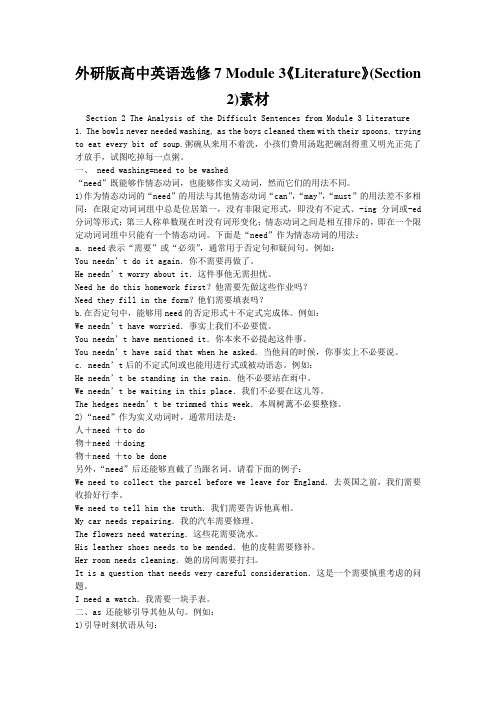
外研版高中英语选修7 Module 3《Literature》(Section2)素材Section 2 The Analysis of the Difficult Sentences from Module 3 Literature 1. The bowls never needed washing, as the boys cleaned them with their spoons, trying to eat every bit of soup.粥碗从来用不着洗,小孩们费用汤匙把碗刮得重又明光正亮了才放手,试图吃掉每一点粥。
一、 need washing=need to be washed“need”既能够作情态动词,也能够作实义动词,然而它们的用法不同。
1)作为情态动词的“need”的用法与其他情态动词“can”,“may”,“must”的用法差不多相同:在限定动词词组中总是位居第一,没有非限定形式,即没有不定式、-ing分词或-ed 分词等形式;第三人称单数现在时没有词形变化;情态动词之间是相互排斥的,即在一个限定动词词组中只能有一个情态动词。
下面是“need”作为情态动词的用法:a. need表示“需要”或“必须”,通常用于否定句和疑问句。
例如:You needn’t do it again.你不需要再做了。
He needn’t worry about it.这件事他无需担忧。
Need he do this homework first?他需要先做这些作业吗?Need they fill in the form?他们需要填表吗?b.在否定句中,能够用need的否定形式+不定式完成体。
例如:We needn’t have worried.事实上我们不必要慌。
You needn’t have mentioned it.你本来不必提起这件事。
You needn’t have said that when he asked.当他问的时候,你事实上不必要说。
外研版高中英语选修7module 3 literatureperiod 2word
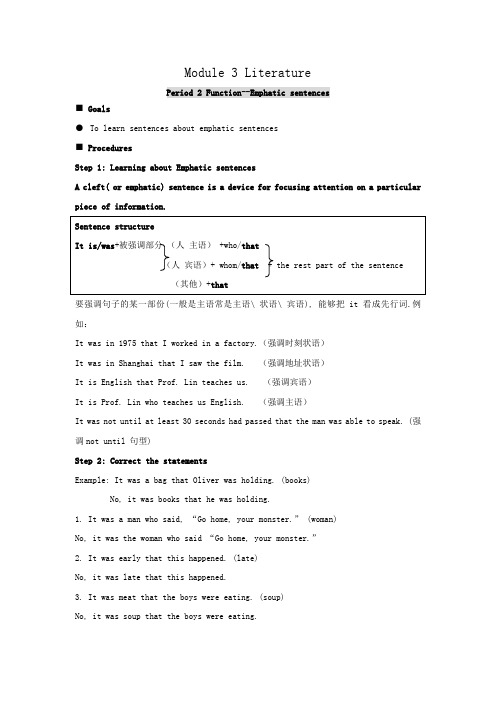
Module 3 LiteraturePeriod 2 Function--Emphatic sentences■ Goals●To learn sentences about emphatic sentences■ProceduresStep 1: Learning about Emphatic sentencesA cleft( or emphatic) sentence is a device for focusing attention on a particular piece of information.要强调句子的某一部份(一般是主语常是主语\ 状语\ 宾语), 能够把it 看成先行词.例如:It was in 1975 that I worked in a factory.(强调时刻状语)It was in Shanghai that I saw the film. (强调地址状语)It is English that Prof. Lin teaches us. (强调宾语)It is Prof. Lin who teaches us English. (强调主语)It was not until at least 30 seconds had passed that the man was able to speak. (强调not until 句型)Step 2: Correct the statementsExample: It was a bag that Oliver was holding. (books)No, it was books that he was holding.1. It was a man who said, “Go home, your monster.” (woman)No, it was the woman who said “Go home, your monster.”2. It was early that this happened. (late)No, it was late that this happened.3. It was meat that the boys were eating. (soup)No, it was soup that the boys were eating.4. It was Mr. Bumble who gave the boys their food. (the warden)No, it was the warden who gave the boys their food.5. It was Mr. Bumble who was locked in a room. (Oliver)No, it was Oliver who was locked in a room.Example: Did Oliver want more clothes? (food)No, what Oliver wanted is more food.1. Did Charles Dickens write novels about modern London? (Victorian London) No, what Charles Dickens wrote was novels about Victorian London.2. Did Nancy pretend to be Oliver’s mother? (sister)No, what Nancy did was to pretend to be Oliver’s sister.3. Did Nancy terrify Oliver? (the man)No, what terrified Oliver was the man.4. Did Oliver go with the man? (shout for help)No, what Oliver did was shouting for help.。
高中英语外研版高中选修7Module3Literature-教学设计
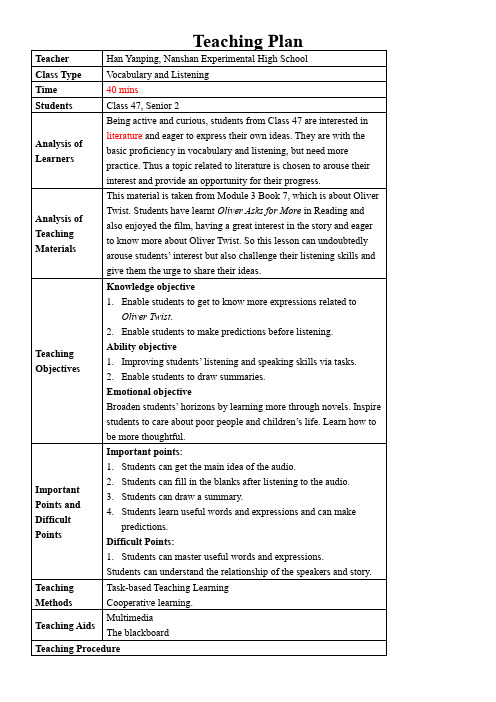
1.Improving students’listening and speaking skills via tasks.
2.Enable students todraw summaries.
Emotional objective
Broaden students’horizons by learning more through novels. Inspire students to care about poor people and children’s life. Learn how to be more thoughtful.
2.To arouse students’curiosity towards the listening materials
Step 2:
Pre-listening
1.Learn and review some words:
2.Give students four sentences and ask them to make predictions about what’s happening.
Students can understand the relationship of the speakerk-based Teaching Learning
Cooperative learning.
Teaching Aids
Multimedia
3.Students can draw a summary.
4.Students learn useful words and expressions andcanmake predictions.
Difficult Points:
高中英语外研版选修七Module 3

Module 3 LiteratureI.教学内容分析本模块以Literature为话题,介绍了著名英国古典文学作家查尔斯•狄更斯(Charles Dickens)的生平和他的作品《雾都孤儿》(Oliver Twist)、《远大前程》(Great Expectations)的片段,旨在通过这样的话题,使学生运用所学的知识谈论小说中的人物及其情节,更多地了解作家的作品及其作品的时代背景和深刻的社会意义。
通过学习能将小说中的精彩片段表演出来,让学生了解如何对人物和事件进行描写。
通过本模块学习,学生要对小说与文学有个辩证认识,学会鉴赏文学的魅力。
Introduction 通过电影Oliver Twist的一幅剧照介绍了著名作家查尔斯•狄更斯(Charles Dickens)。
并设计相关的问题对剧照中的人物和故事发展进行预测,在一定的练习中了解和熟悉所涉及到的词汇和短语,让学生进一步熟悉这些词汇,为本模块的学习奠定基础。
Reading and Vocabulary (1) 部分通过阅读《雾都孤儿》中的一段标题为“Oliver Asks for More”片段,设计了以下的任务:1. 学会对素材片段进行概括,培养学生的总结能力和对文章中心的把握能力;2. 学习相关的词汇和短语,为进一步理解课文扫清障碍,培养学生学习生词的能力,解决了方法问题,同时设计一定的练习,巩固所学习的词汇;3. 在词汇学习的基础上,通过完成素材中的句子填写练习,完成从词到句的功能转变,让学生不仅能学习词汇,而且能更好地巩固一定固定意义的句子结构。
Grammar (1) 部分通过观察课文中的例句,要求学生能够识别倒装句的基本形式,并能运用倒装表达强调意义。
Speaking (1) 部分是阅读文章后所展开的一项活动,要求学生能够模仿其内容和角色进行适当的角色扮演练习,并对人物进行评价。
Vocabulary and Listening部分为《雾都孤儿》的精彩片段,旨在听的基础上去理解这部小说,并完成四项任务:1. 提供一定的句子和词汇,扫清了听力中可能产生的障碍;2. 提供问题,预测听力内容和问题答案,引导听力任务的顺利进行;3. 听取一段精彩的片段,判断所预测的问题答案是否正确,然后回答问题;4. 要求听第二遍,完成信息获取。
外研版高中英语选修7 Module 3《Literature》
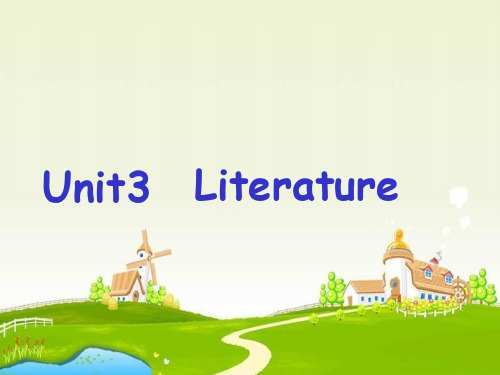
Grammar(1): Inversion Used for Emphasis
• 英语的正常语序是主语在前,谓语在后。但 有时为了语法的需要或为了强调,把全部谓 语或谓语的一部分提到主语前面,这种语序 在语法称为倒装。除了在疑问句中,句子要 用倒装外,还有一些句子要用倒装。英语的 倒装一般分成两种,一是把谓语动词全部放 在主语前,叫做全倒装。一是把谓语的助动 词部分放在主语前,叫做部分倒装。
•
部分倒装 – only所修饰的副词,介词短语和状语从句放 在句首时, 如: • 1) Only then did he know that he was rejected by the boss. • 2) Only in this way can you collect more stamps. • 3) Only when her father came back was she able to go to school.
一些含有否定意义的副词或连词 如hardly, never, not, not only, little,
c.用so作简单回答时表明前面说的情况也适 用于另一个人, 如: • He likes swimming in summer very much. So do I. • We saw the football match last week. So did they. • The girl can speak fluent English. So can the boy.
• • • •
•
• •
但如果主语是人称代词时,不用倒装,如: Here it is. Down it dropped. – 直接引语的部分或全部放在句首时,如: 1) “Who will come here to help you?” asked the teacher. 2) “I don’t think he will come.” said the girl. – 当介词短语在句首时,如: 1) In front of the old house sat an old woman. 2) On the top of the mountain stands a tower.
高中英语外研版 选修7 Module 3 Literature

文学核心词汇. ..$ .., ..?.(哀痛) ,..(分发) ..’(支撑) ..’(食欲) .., .().’ .();;高频短语.用这种方法.抓紧,握紧.刚一……就…….惊讶地,吃惊地.用……声音(说),……声地.挑选.大量的.使某人关注某事.喜欢……... ... . .重点句式.,, .粥碗从来用不着洗,孩子们非用汤匙把碗刮得明光铮亮了才住手,试图吃掉每一点粥。
.,, .他们这样把碗刮干净后,就坐在那儿,眼巴巴地瞅着汤锅,似乎要把它也吞进肚子里。
. .奥利弗·特威斯特被选中了。
., .至少过了三十秒钟,他才说出话来。
. .孩子的话刚出口,大师傅就操起勺子狠狠地敲他的脑袋。
.“!” .“我还从来没有听过这样的事情呢!”林勃金斯先生说道。
;;;;知识详解①.服务;服役;端上(饭菜),供应;满足……的需要;合乎(目的);接待(回归课本) ,, .开饭的时候,大师傅在锅边舀粥,有两个女人替他打杂。
【归纳总结】【例句探源】①, .作为党员,我们要全心全意为人民服务。
②, .毕业后,他回到希腊服军役。
③?有人接待您了吗?④(朗文) .这张旧的长沙发只好用作客人的床了。
⑤’ .二者不是一回事,并且用途也不同。
【即境活用】. ..;.;.;.;解析:选。
句意是:那家饭店从六点到九点提供晚餐。
长达二十年了,这种习惯一直没有改变。
第一个空用的被动语态形式,表示“(饭菜)被提供”。
第二个空用作系动词用,表示“保持”,作表语。
★ .....解析:选。
充当。
句意为“在这墓中发现的动物骨头,将作为科学研究的重要材料。
”②.报酬;奖励;赏金.酬劳;奖赏(回归课本) , .第二天早晨,济贫院大门外贴出了一张告示,向愿意雇用奥利弗的人提供奖赏。
【归纳总结】【例句探源】①’; .我不是为了报酬做这件事,只是由于爱好。
② .作为对所提供服务的奖赏,他得到了一枚奖章。
③$ .他因抓获罪犯而获得美元的酬金。
④, .如果他们达成目标,就要论功行赏,光是讲好话是不够的。
外研版高中英语选修七黑龙江省大庆市林甸一中Module3 Literature导学案
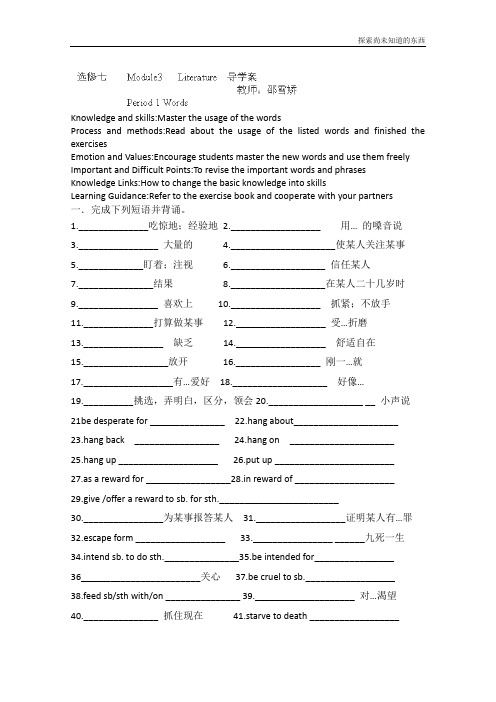
Knowledge and skills:Master the usage of the wordsProcess and methods:Read about the usage of the listed words and finished the exercisesEmotion and Values:Encourage students master the new words and use them freely Important and Difficult Points:To revise the important words and phrases Knowledge Links:How to change the basic knowledge into skillsLearning Guidance:Refer to the exercise book and cooperate with your partners一.完成下列短语并背诵。
1.______________吃惊地;经验地2.__________________ 用… 的嗓音说3.________________ 大量的4._____________________使某人关注某事5._____________盯着;注视6.___________________ 信任某人7._______________结果8.___________________在某人二十几岁时9.________________ 喜欢上10.__________________ 抓紧;不放手11.______________打算做某事12.__________________ 受…折磨13.________________ 缺乏14.__________________ 舒适自在15._________________放开16._________________ 刚一…就17.__________________有…爱好18.___________________ 好像…19.__________挑选,弄明白,区分,领会20.___________________ __ 小声说21be desperate for _______________ 22.hang about_____________________23.hang back _________________ 24.hang on _____________________25.hang up ____________________ 26.put up ________________________27.as a reward for _________________28.in reward of ____________________29.give /offer a reward to sb. for sth.________________________30.________________为某事报答某人31.__________________证明某人有…罪32.escape form __________________ 33.________________ ______九死一生34.intend sb. to do sth._______________35.be intended for________________36________________________关心37.be cruel to sb.__________________38.feed sb/sth with/on _______________ 39.____________________ 对…渴望40._______________ 抓住现在41.starve to death __________________42._______________ 堆起来43._______________ 支持44.be fed up with_______________ 45.It is cold for May. _______________二词汇训练,根据首字母和汉语意思填写单词。
外研版高中英语选修7 Module 3《Literature》单元测试

Module 3 Literature(时间:120分钟满分:150分)第一部分听力(共两节,满分30分)第一节(共5小题;每小题1、5分,满分7、5分)听下面5段对话.每段对话后有一个小题,从题中所给的A、B、C三个选项中选出最佳选项,并标在试卷的相应位置。
听完每段对话后,你都有10秒钟的时间来回答有关小题和阅读下一小题。
每段对话仅读一遍。
1.What can we know about the woman?A.She has just bought a mobile phone、B。
She finds it pretty easy to use the mobile phone、C。
She often forgets to turn on the mobile phone、2.Which of the following is the most probable reason why Bill lost his job?A.He was usually late for work、B。
He often made mistakes in his work and asked for leaves、C。
He made a serious mistake in business with a company、3.What do we know from the conversation?A.The man regretted inviting his wife's boss to the dinner party、B.The two speakers enjoyed themselves at the dinner party、C。
The boss of the man’s wife left the party earlier、4.How does the man feel about his interview?A。
高考英语外研版:选修7+Module+3+Literature
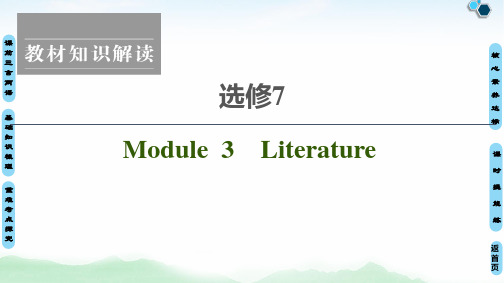
养 达
基
础 知
3.rough adj._多__暴__力__的__;__犯__罪__率__高__的__
标
识
梳 理
4.drag v._拖__;__拉__;__硬__拽____
课 时
重 难
5.prison n._监__狱__
考
提 能
点 探
6.wedding n._婚__礼__
练
究
返
首
页
课 前
7.illegally adv._违__法__地__;__非__法__地___
心 素
语
about the culture.
养 达
基
础 2.Whenever he is faced with difficulties in writing, he won't give
标
知
识
梳 up easily.
课
理
时
重 3.What makes this novel stand out is its unique characters, language, 提
核
三 言 两
心
1.After three days without food, the men were close to _s_ta_r_v_a_ti_o_n__. 素
语
养
基 础 知
If we had come later, they would have _st_a_r_v_ed__ to death.(starve) 2.The man in the river _d_e_s_p_er_a_t_el_y__ tried to reach the side.The
外研版高中英语选修七Module 3Literature教案2

Module 3 LiteratureThe first period (词汇教学)Teaching aims1.Train and develop students’ ability of solving problems(multiple choices)2.train and develop students’ ability of reading comprehension3.enable students’ to master the usages of the following 9 words: Scene; feed: Serveeager; appetite ;whisper; desperate; seize;hangTeaching procedures:Step 1. Check students’ homework1. Check the answers of daily exercise 59 and solve the difficult problems in groups ( Students’ activity 1)T: Have you done your daily exercises ?First let me check your answers . Then you can deal with your problems in your groups.2. Check the answers of reading material A in the newspaperStep 2 New words1.Scene1). (戏剧的)一场2). 场面;事件[C]3.) 景色,景象;(舞台)布景[C]What a fantastic mountain scene! 多么迷人的山景!4.) (事件发生的)地点,现场;(戏剧等的)背景[the S][(+of)]The criminal fled the scene.罪犯逃离了现场。
外研版高中英语选修七最新版精练精析:Module3《Literature》模块质量评估(三)(选修7)

高中英语学习材料(灿若寒星*制作整理)2013最新版高中英语精练精析:Module3《Literature》模块质量评估(三)(外研版选修7)第二部分英语知识运用(共两节,满分45分)第一节单项填空(共15小题;每小题1分,满分15分)21. —Did you remember to give Tom the book you borrowed from him?—Yes, no sooner had I seen him ________I gave it to him.A. whileB. thanC. suddenlyD. once22. The news that an earthquake would hit our town led to our great ________.A. safetyB. concernC. contentD. excitement23. Not until I shouted at the top of my voice________ his head.[2012邯郸高二检测] A.did he turnB.he turnedC.didn’t he turnD.had he turned24. Only ________ as a volunteer ________how important it is to grasp English.[2012嘉峪关高二检测]A. when will I work; I realizeB. when I work; I will realizeC. when I work; will I realizeD. when I will work; will I realize25. After hours of searching, their patience was ________and they found the lost travelers in a valley.[2012南安高二检测] A. committed B. confirmedC. rewardedD. reflected26. John was busy writing a composition last night, only ________once in a while to have a drink.A.to stop B.stoppedC.having stopped D.stopping27. I need Jim ________the trees, because they need ________in this dry area.A. to water; wateringB. to water; wateredC. water; wateringD. waters; watering28. He ________a big and ripe apple and put it in his bag.A. turned outB. picked outC. paid offD. went off29. When we climbed to the top of the mountain, we had a good ________of the whole city.[2012绍兴高二检测]A. sceneryB. sceneC. viewD. sight30. The officers narrowly escaped ________in the hot battle.[2012杭州高二检测] A. have killed B. to killC. to be killedD. being killed31. As we all know, a computer can store ________information.A. a vast amount ofB. a large number ofC. a good many ofD. many an32. “Are you really leaving? ” asked Fred________astonishment.A. forB. inC. likeD. to33. He talked of his trip to Hong Kong, ________attractive place, in________cheerful voice.A. a; aB. an; aC. a; theD. an; the34. If foreign aid dries up,the situation for the rebels in Libya will be________.A. desperateB. separateC. beneficialD. sensitive35. —The weather here in summer is so changeable. Please take an umbrella when you go out.—________.A. Well, don’t worryB. Well, it just dependsC. Oh, take it easyD. OK, just in case第二节完形填空(共20小题;每小题1. 5分,满分30分)Alice’s Adventures in Wonderland is one of the most loved children’s books of all time, and many adults enjoy it as well. It 36 the story of a young girl named Alice, who follows a rabbit 37 a magical world called Wonderland. She has many 38 which seem to change the rules of reasoning or 39 sense. The 40 of the book comes from its 41 , interesting story, and art work.Charles later wrote the story down 42 the name of Alice’s Adventures Under Ground and gave it to Alice as a Christmas present. Later, he gave a copy to his friend George MacDonald. George read it to his children and they loved it. George 43 to Charles that he make a book from his 44 . Charles then wrote more parts to the story 45 it was around 35, 000 words. It was first printed in 1866, with art work by John Tenniel, under the name of Alice’s Adventures in Wonderland. The book was a(n) 46 success.One of its first fans was Queen Victoria. She immediately requested a 47 of all of Lewis Carroll’s works. She was 48 to find that they included many works on 49 . 50 , Charles Dodgson was a highly respected mathematician. This can be seen in many puzzles and plays on 51 that appear in his books and poems.52 the story was first printed, it has 53 selling up to the present day. It has been 54 into over fifty languages and has had several movies 55 on it. The story is even mentioned in the popular 1999 film The Matrix by the character Morpheus.36. A. tells B. speaks C. talks D. says37. A. coming B. entering C. going D. running38. A. experiments B. expressions C. hardships D. experiences39. A. ordinary B. normal C. common D. regular40. A. popularity B. preparation C. opportunity D. opposition41. A. image B. impression C. imagination D. improvement42. A. in B. under C. for D. at43. A. suggested B. said C. lied D. pointed44. A. novel B. story C. film D. puzzle45. A. unless B. when C. while D. until46. A. slow B. low C. immediate D. informal47. A. correction B. collection C. competition D. connection48. A. surprised B. disappointed C. upset D. angry49. A. history B. politics C. geography D. math50. A. In order B. In fact C. In place D. In conclusion51. A. addressing B. discussing C. reasoning D. greeting52. A. Since B. After C. When D. Before53. A. let B. found C. left D. kept54. A. translated B. made C. spelled D. written55. A. put B. taken C. based D. relied第三部分阅读理解(共两节,满分40分)第一节(共15小题;每小题2分,满分30分)(A)F. Scott Fitzgerald, born on September 24, 1896, an Americannovelist, was once a student of St. Paul Academy, the NewmanSchool and attended Princeton University for a short while. In1917 he joined the army and was posted in Alabama, where he met his future wife Zelda Sayre. Then he had to make some money to impress her.His life with her was full of great happiness, as he wrote in his diary: “My own happiness in the past often approached such joy that I could share it even with the person dearest to me but had to walk it away in quiet streets and take down part s of it in my diary. ”This Side of Paradise, his first novel, was published in 1920. Encouraged by its success, Fitzgerald began to devote more time to his writing. Then he continued with the novel The Beautiful and Damned (1922), a collection of short stories Tales of the Jazz Age (1922), and a play The Vegetable (1923). But his greatest success was The Great Gatsby, published in 1925, which quickly brought him praise from the literary world. Yet it failed to give him the needed financial security. Then, in 1926, he published another collection of short stories All the Sad Young Men.However, Fitzgerald’s problems with his wife Zelda affected his writing. During the 1920s, he tried to reorder his life, but failed. By 1930, his wife had her first breakdown and went to a Swiss clinic. During this period, he completed novels Tender Is the Night in 1934 and The Love of the Last Tycoon in 1940. While his wife was in hospital in the United States, he got totally addicted to alcohol. Sheila Graham, his dear friend, helped him fight his alcoholism.56. How many novels written by Fitzgerald are mentioned in the passage?A. 5B. 6C. 7D. 857. Which of the following is the correct order to describe Fitzgerald’s life according to the passage?a. He became addicted to drinking.b. He studied at St. Paul Academy.c. He published his first novel This Side of Paradise.d. The Great Gatsby won high praise.e. He failed to reorder his life.f. He joined the army and met Zelda.A. f-c-e-a-b-dB. b-e-a-f-c-dC. f-d-e-c-b-aD. b-f-c-d-e-a58. We can infer from the passage that Fitzgerald ________.A. had made some money when he met Zelda in AlabamaB. was well educated and well off before he served in the armyC. would have completed more works if his wife hadn’t broken downD. helped his friend get rid of drinking while his wife was in hospital59. The passage is probably followed by a concluding paragraph about________.A. Zelda’s personal lifeB. Zelda’s illness and treatmentC. Fitzger ald’s friendship with GrahamD. Fitzgerald’s contributions to the literary world(B)Of all the famous English writers, probably the best knownis William Shakespeare.He was born in Stratford-upon-Avon in1564 on April 23rd.His father was an important man in town so Shakespeare had agood upbringing. Shakespeare probably went to school (althoughno records survive to prove this) but not university. He got married when he was 18 to Anne Hathaway and the couple had 3 children.Shakespeare wrote 38 plays and 154 sonnets (a sonnet is a kind of poem). He began working in his hometown of Stratford but by 1592, he was writing in London. He became rich enough to buy a house in the capital and one in Stratford. He wrote sad stories called tragedies, like Romeo and Juliet, funny stories orcomedies, romantic stories and stories about historical figures such as Julius Caesar.Shakespeare died on his birthday in 1616, almost 400 years ago. But why is his work still popular today?His work looked at common human themes, such as betrayal, murder, lust, power, ambition and love. These themes are as much a part of human nature today as they were all those years ago and are the themes we see in modern soap operas and Hollywood films. Even though his theatre, The Globe, was burned down in 1613, it was rebuilt in London in 1997 and you can still see his plays performed there today.Shakespeare’s influence on the English language can still be felt today. We talk about “fair play”, meaning honest behaviour but this phrase was first used by Shakespeare. He coined the phrase “you can have too much of a good thing”. And it was Shakespeare who came up with the expression to disappear “into thin air” which we still use today when we lose something.Shakespeare’s works have been translated into every major language in the world. And perhaps we’ll still be as fascinated by his works 400 years from now as we’ve been for almost the last 400.60. Romeo and Juliet belongs to________.A. comediesB. tragediesC. romantic storiesD. historical stories61. Why is Shakespeare still well received today?A. Because his plays can always remind you of your good old days.B. Because his plays reflect common human themes.C. Because there have been several Hollywood films based on his plays.D. Because his plays are easy to understand.62. Which of the following is RIGHT according to the passage?A. Shakespeare graduated from Oxford University.B. Shakespeare passed away on April 23rd, 1616.C. The language in Shakespeare’s original works is still used today.D. Shakespeare is the most famous writer around the world.63. We can conclude that Shakespeare ________.A. made great contributions to the English languageB. was born in a poor familyC. was fond of making money by selling housesD. created modern soap operas(C)A child who has once been pleased with a tale likes, as a rule,to have it retold in almost the same words, but this should not leadparents to treat printed fairy stories as formal texts. It is alwaysmuch better to tell a story than read it out from a book, and, if aparent can produce what, in the actual circumstances(情况) of the time and the individual child, is an improvement on the printed text, that’s much better.A charge made against fairy tales is that they harm the children by frightening them or making them sad thinking. To prove the latter, one would have to show in a controlled experiment that children who had read fairy stories were more often guilty of cruelty than those who had not. As to fears, there are, I think, some cases of children being strongly terrified by some fairy stories. This also arises from the child who has heard the story once. However, familiarity with the story by repetition turns the pain of fear into the pleasure of a fear faced and mastered.There are also people who are opposed to fairy stories in that they are not true, that giants, witches, two-headed dragons, magic carpets, etc. do not exist; and that, instead of being fond of the strange side in fairy tales, the child should be taught how to adapt to reality by studying history and mechanics. I find such people, I must say so strange that I do not know how to argue with them. If their cases were sound, the world should be full of mad men attempting to fly from New York to Philadelphia on a stick or covering a telephone with kisses in the belief that it was their beloved girlfriend.No fairy story has ever claimed(声称) to be description of the real world and no clever child has ever believed that it is.64.The author considered that a fairy story is more effective________ .A. when a story is repeated without any changeB. when we treat a story as a jokeC. when the parent makes some changes about a storyD. when the story is set in the present time65.What is the advantage claimed for repeating fairy stories to young children?A. Making them less fearful.B. Developing their power of memory.C. Making them believe there is nothing to be afraid of.D. Encouraging them not to have strange beliefs.66.According to the last paragraph, we can know ________.A. fairy stories are still being made upB. there are some misunderstandings about fairy talesC. people try to update old fairy storiesD. there is more concern for children’s fears nowadays67. According to the passage, what’s the writer’s attitude towards fairy stories?A. Supportive.B. Objective.C. Neutral.D. Critic.(D)Here are brief introductions to some popular novels.WATCHERS Two mutants(突异变种), both changedfrom the animals they once were, escape and no one whoencounters them will ever be the same again. A lonely widower,a ruthless assassin, a beautiful woman and a government agentare drawn together in a deadly hunt. All four are cruelly propelled(推进)towards a fight with an evil beyond human imagining.THE MASK She had appeared out of nowhere in front ofCarol’s car. She was a teenager with no past and no memory.Carol and Paul were instantly drawn to her, and they called herJane—she was the daughter they never had. But then thequestions began. Where had Jane come from? Who was thegirl behind the mask?THE FUNHOUSE Young Ellen ran away, joined a carnival,married a man she grew to hate and gave birth to a child so uglythat she killed it. Years later she has a new husband and twochildren, Amy and Joey, but the time has come for Amy and Joeyto pay for her sins(罪恶)as Amy is pregnant and the carnivalis back in town.LOVE STORY He is Oliver Barrett IV, a rich jockery from astuffy Wasp family on his way to a Harvard degree and a career inlaw. She is Jenny Cavilleri, a wisecracking working-class beautystudying music at Radcliffe. They are opposites in nearly everyway. But they fall in love. This is their story.68. Which novel is about a fierce fight between justice and evil?A. WA TCHERSB. THE MASKC. THE FUNHOUSED. LOVE STORY69. In the novel WATCHERS, two mutants_________.A. were once animalsB. transform everything they meetC. hunt for beautiful womenD. kill a lot of people70. The underlined sentence in the brief introduction to the novel LOVE STORY means _________.A. they are the same in every wayB. they are quite different from each other in most aspectsC. they have a lot in commonD. they are attracted by each other第二节(共5小题;每小题2分,满分10分)根据短文内容,从短文后的选项中选出能填入空白处的最佳选项。
外研版高中英语选修7《Module3Literature》(Section3)word教案
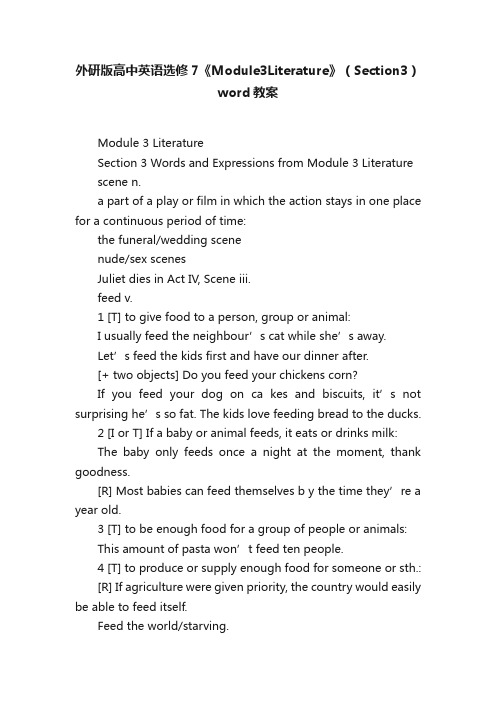
外研版高中英语选修7《Module3Literature》(Section3)word教案Module 3 LiteratureSection 3 Words and Expressions from Module 3 Literature scene n.a part of a play or film in which the action stays in one place for a continuous period of time:the funeral/wedding scenenude/sex scenesJuliet dies in Act IV, Scene iii.feed v.1 [T] to give food to a person, group or animal:I usually feed the neighbour’s cat while she’s away.Let’s feed the kids firs t and have our dinner after.[+ two objects] Do you feed your chickens corn?If you feed your dog on ca kes and biscuits, it’s not surprising he’s so fat. The kids love feeding bread to the ducks.2 [I or T] If a baby or animal feeds, it eats or drinks milk:The baby only feeds once a night at the moment, thank goodness.[R] Most babies can feed themselves b y the time they’re a year old.3 [T] to be enough food for a group of people or animals:This amount of pasta won’t feed ten people.4 [T] to produce or supply enough food for someone or sth.:[R] If agriculture were given priority, the country would easily be able to feed itself.Feed the world/starving.5 [T] to give a plant substances that will help it grow:Don’t forget to feed the tomatoes.serve v.to provide food or drinks:Do they serve meals in the bar?Breakfast is served in the restaurant between 7 and 9.We arrived at the hotel and were served with champagne and canapés.All recipes in this book, unless otherwise stated, will serve (= be enough for) 4 to 5 people.[+ object + adjective] Serve the tarts hot with custard or whipped cream.eager adj.wanting very much to do or have something, especially something interesting or enjoyable:the children’s eager facesShe sounded very eager to meet you.They crowded round the spokesperson, eager for any news.supportv.1 to agree with and give encouragement to someone or something because you want them to succeed:My father supported the Labour Party all his life.The majority of people in the town strongly support the plans to build a by-pass.I think it’s important to support local businesses by buyi ng locally.2 (US USUALLY root for, AUSTRALIAN ENGLISH barrack for) MAINLY UK If you supporta sports team or a sports player, you want them to win, andmight show it by going to watch them play:Which team do you support?n. agreement with and encouragement for an idea, group or person: Environmental groups are fast gaining support among young people.We've succeeded in drumming up a lot of local support for our attempt to stop the hospital being closed.I signed a petition in support of the campaign to end the marketing of baby milk in developing countries.hang v.1 [I or T] to kill someone, especially as punishment for a serious crime, by dropping them with a rope tied around their neck, or to die in this way: (hanged or hung, hanged or hung) He was found guilty and hanged later that year.With so little evidence to prove her guilt, few people thought she should hang. [R] The woman tried to hang herself with a sheet.2 [I or T; + adverb or preposition] to fasten or support something at the top leaving the other parts free to move, or to be held in this way: (hung, hung)A heavy gold necklace hung around her neck.Long creepers hung (down) from the trees.The curtains hung in thick folds.Hang your coat and hat (up) on the rack over there.Many of his finest pictures hang/are hung (= are fixed to the wall so that they can be seen) in the National Gallery.Hang the pheasant/Let the pheasant hang for a few days for the flavour to improve before you cook it.reward n.1 something given in exchange for good behaviour or goodwork, etc:There’s a reward for whoever finishes first.The rewards of motherhood outweigh the anguish.2 an amount of money given to someone who helps the police or who helps to return stolen property to its owner: The police offered a reward for any information about the robbery.rough adj.dangerous or violent; not calm or gentle:a rough area of townThe other boys were rough, always looking for a fight.I’m always sea-sick if the water/wind/sea/weather is rough (= stormy).rough tempera rough neighborhoodescapev. 1 [I or T] to get free from something, or to avoid something: Two prisoners have escaped.A lion has escaped from its cage.She was lucky to escape serious injury.He narrowly (= only just) escaped a fine.His name escapes me (= I have forgotten his name).Nothing important escapes her notice/attention.2 [I] SPECIALIZED to press the key on a computer keyboard which allows you to leavea particular screen and return to the previous one or to interrupt a process: Escape from this window and return to the main menu.n. 1 [C or U] when someone succeeds in getting out of a place or a dangerous or bad situation:He made his escape on the back of a motorbike.an escape route /a narrow escape 九死一生They had a narrow escape (= only just avoided injury or death) when their car crashed.2 [C] an accidental loss:an escape of radioactivity3 [S] something that helps you to forget about your usual life or problems: Romantic novels provide an escape from reality.repay v.to pay back or to reward someone or something:He had to sell his car to repay the bank loan.She repaid the loan to her mother.[+ two objects] She repaid her mother the loan.How can I ever repay you for all your kindness?attain v.to reach or succeed in getting something; to achieve:He has attained the highest grade in his music exams.We need to identify the best ways of attaining our objectives/goals.India attained independence in 1947, after decades of struggle.concern n.1 a feeling of worry or nervousness, or something that worries you:Concern for the safety of the two missing teenagers is growing.There’s a lot of public concern about/over dangerous toxins rece ntly found in food. [+ that] My concern is that you’re not getting enough work done.2 something that is important to you, or when something isimportant:[+ to infinitive] His concern to appear sophisticated amused everyone.The company’s sole concern is to ensure the safety of its employees.There’s a matter of some concern that I have to discuss with you.accumulate v.1 [T] to collect a large number of things over a long period of time:As people accumulate more wealth, they tend to spend a greater proportion of their incomes.The company said the debt was accumulated during its acquisition of nine individual businesses.We’ve accumulated so much rubbish over the years.2 [I] to gradually increase in number or amount:A thick layer of dust had accumulated in the room.If you don’t sort out the papers on your desk on a regular basis they just keep on accumulating.trial n.the hearing of statements and showing of objects, etc. in a court of law to judge whether a person is guilty of a crime or to decide a case or a legal matter: trial proceedingsTrial by jury is a fundamental right.It was a very complicated trial that went on for months.She’s going on/standing trial for fraud.accomplish v.to finish something successfully or to achieve something:The students accomplished the task in less than ten minutes.She accomplished such a lot during her visit.I feel as if I’ve accomplished nothing since I left my job.。
外研版高中英语选修七Module 3LiteratureGrammar教案1

效果
检测
与
校正
教
学
札
记
强调句
基本句型I:It is (was)+被强调成分+that (who, whom)+其余成分
I am going to Beijing to attend a meeting tomorrow morning by air.
It is I who (that) am going to Beijing to attend a meeting tomorrow morning by air.
It is Beijing that I am going to attend a meeting tomorrow morning by air.
It is a meeting that I am going to Beijing to attend tomorrow morning by air.
It is tomorrow morning that I am going to Beijing to attend a meeting by air.
It is by air that I am going to Beijing to attend a meeting tomorrowmorning.
It is a meeting that I am going to Beijing to attend tomorrow morning by air.
It is tomorrow morning that I am going to Beijing to attend a meeting by air.
外研版高中英语选修7 Module 3《Literature》word讲义

教材:选修7课题: Module 3 Literature年级:高二科目:英语天津一中2015-2016年第二学期高二英语讲义3课时1学生应掌握的词汇词组互译:1.in astonishment _______________2.in a…voice_______________3. a huge amount of _______________4.bring sth to the attention of sb_______________5.stare at _______________6.believe in sb _______________7.as a result _______________8.in one’s early twenties_______________9.be come fond of _______________10.hold on to _______________11.intend to do _______________12.suffer from _______________13. a lack of _______________14.feel at home _______________15.let go of sb/sth _______________课上典型例题:1我的表可能需要清洗了,因为这周它慢了。
My watch probably__________ __________as it__________ __________losing time this week.2他盯着这个单词,努力想记起它的意思。
He__________ __________ the word__________ __________remember what it meant.3我的儿子吃惊的盯着我,好像已经忘了我是谁。
My son stared at me__________ __________, as if he __________ __________ who I was. 4他脸都气白了。
外研版高中英语选修7教学课件 Module3 Literature
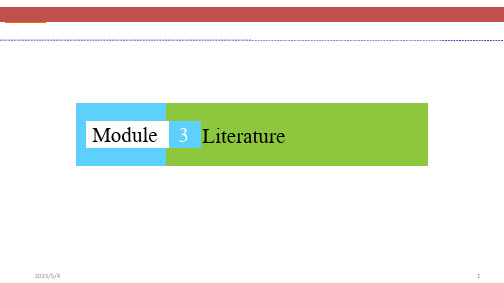
The boys became quite 4.________with hunger.A
tall boy said if he didn’t have another bowl of soup,he might eat the 5.________.
2023/5/4
14
The boys had a(n) 6.________,and Oliver happened
Oliver’s name on it.
2023/5/4
11
2.The warden’s face became pale,why? A.Because he was surprised by what Oliver
said. B.Because he was ill. C.Because he was very hungry. D.Because he was very tired. 答案: A
4
Her last pick,in September,2010,was U.S.author Jonathan Franzen’s already bestselling novel of dysfunctional (有缺陷 的) families “Freedom”.
“A Tale of Two Cities” was first published in 1859 and is set against the backdrop (背景) of the French Revolution.“Great Expectations” was published in 1861 and tells the story of an orphan boy called Pip growing up in 19th century England.
外研版高中英语选修七黑龙江省大庆市林甸一中Module3 LiteraturePeriod 3 导学案

Knowledge and skills: Get students to master the vocabulariesEmotion and Values: Help students to enjoy using wordsDifficult Points: Lead the students to talk in class activelyImportant Points: Help the students to improve their abilityLearning Guidance: Read the new words fluently and finish the taskscene n. scenic adj.on the scene 在现场behind the scene 在幕后,秘密的,暗中(1) 场景场面The film contains violent scenes.译:___________________________________ (2) 事发地点The police soon arrived at the scene of the crime.译:_______________________ (3) 景色、景象、景致He photographed a wide range of street scenes.A delightful rural scene 译:_____________________________________2. Whisper n. 私语;谣传;飒飒的声音vi.耳语;密谈;飒飒地响vt. 低声说出whisper a word in my ear/ speak in a whisper/whispersdesperate v. 极需要(1) 绝望而不惜冒险的, 不顾一切的, 拼命的Time was running out and we were getting desperate.译:______________________ (2) desperate for / to do sth. 极需要他急需要找到一份工作。
- 1、下载文档前请自行甄别文档内容的完整性,平台不提供额外的编辑、内容补充、找答案等附加服务。
- 2、"仅部分预览"的文档,不可在线预览部分如存在完整性等问题,可反馈申请退款(可完整预览的文档不适用该条件!)。
- 3、如文档侵犯您的权益,请联系客服反馈,我们会尽快为您处理(人工客服工作时间:9:00-18:30)。
外研版高中英语选修七黑龙江省大庆市林甸一中Module3LiteraturePeriod2导学案Period2 Reading and vocabulary ;Reading practice and Cultural corner Knowledge and skills:Develop students' reading ability.Process and methods:Individual work or pair work or group work to get every student to participate in class activities.Emotion and Values:Help the students to improve their reading ability.Difficult Points:Lead the students to talk in class actively.Learning Guidance:read the new words fluently and finish the task,referring to the dictionary.A. Read the passage on Pages 30-31 of S tudents’ Book 7 and fill in the blanks with proper words.The boys were 1______ in a large stone hall. At meal times, the warden, with the help of two women, 2______the soup from a large pot. Each boy was allowed only one bowl of soup. Boys usually have excellent 3______. Oliver and his companions slowly 4______ for three months, and finally they became 5______ with hunger. They decided one of them should ask for more soup and Oliver was 6______. One evening, after finishing his bowl of soup, Oliver rose from his table and walked up to the warden. 7______ by his own courage, he said, “Please sir, I want some more.” 8______ had Oliver finished his words than the warden hit him on the head with the soup spoon. At last Oliver was locked in a room and the next morning, a notice was put up on the door of the workhouse, offering a 9______ to anyone who would like to 10______ Oliver. B. Read th e passage on Page 39 of Students’Book 7 and fill in the blanks with proper words.At Charles Dickens’ time, London was the largest and richest city in the world. However, the wealth was 1______ unfairly among people. The East End was London’s poorest 2______, where people lived a hard life. Their 3______ was ignored by those 4______ and they could not hope to 5______ an acceptable standard of living. But on the other hand, some Londoners had 6______ a lot of money through trade. Banks and 7______ were housed in the Old City of London and there were many squares and gardens with water pumps and 8______. Rich families had servants and 9______ who served them. Dickens provided a social 10______ of London life in his novels.C. Cultural cornerRead the passage on Page 41 of Students’ Book 7 and make the best choices.1. This passage mainly talks about _____.A. Charles Dickens’ famous novelsB. Charles Dickens in generalC. Dickens’ efforts to improve the lives of the poorD. the reason why Dickens’ novels were popular2. Which of the followings is NOT true about Dickens according to the passage?A. He made a living at an early age.B. It was in his 30s that he began writing novels.C. His father was put in prison for debts.D. When Oliver Twist came out, he was in his thirties.3. What can be inferred from this passage?A. Great Expectations was one of his famous novels.B. Dickens was good at describing the life of the poor.C. The novelist was fond of travelling around.D. His novel drew attention of the public to child poverty.4. What does “it” in the last sentence of Paragraph 1 refer to?A. Poverty.B. Bills.C. Work.D. Prison.5. According to the last paragraph, we may learn that _____.A. Dickens died of heart attackB. Dickens went to America to give lecturesC. Dickens sometimes couldn’t control his feelings while readingD. Dickens’ novels were popular only in America and EnglandPeriod2A. 1. Fed 2. served 3. appetite 4. starved 5. wild / desperate6. Chosen7. Frightened8. No sooner9. reward 10. employ / hireB. 1. distributed 2. district 3. welfare 4. taxpayers 5. attain 6. accumulated7. corporations 8. fountains. 9. maids 10. commentary C 1-5 BDBACPeriod 3 language pointsKnowledge and skills: Get students to master the vocabulariesEmotion and Values: Help students to enjoy using wordsDifficult Points: Lead the students to talk in class activelyImportant Points: Help the students to improve their ability Learning Guidance: Read the new words fluently and finish the taskscene n. scenic adj.on the scene 在现场behind the scene 在幕后,秘密的,暗中(1) 场景场面The film contains violent scenes.译:___________________________________ (2) 事发地点The police soon arrived at the scene of the crime.译:_______________________ (3) 景色、景象、景致He photographed a wide range of street scenes.A delightful rural scene 译:_____________________________________2. Whisper n. 私语;谣传;飒飒的声音vi.耳语;密谈;飒飒地响vt. 低声说出whisper a word in my ear/ speak in a whisper/whispersdesperate v. 极需要(1) 绝望而不惜冒险的, 不顾一切的, 拼命的Time was running out and we were getting desperate.译:______________________ (2) desperate for / to do sth. 极需要他急需要找到一份工作。
